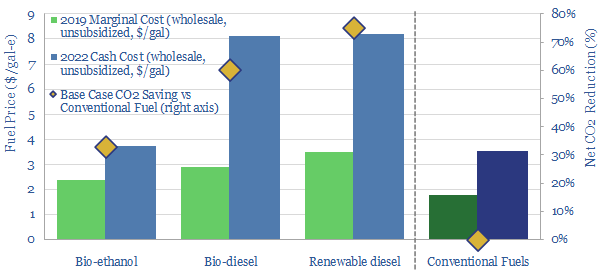Our outlook for biofuels in energy transition investigates how food and energy shortages will re-shape liquid biofuels? This 11-page note explores four questions. Could the US re-consider its ethanol blending to help world food security? Could rising cash costs of bio-diesel inflate global diesel prices to $6-8/gal? Will renewable diesel expansion ambitions be dialed back? What outlook for each liquid biofuel in the energy transition?
In principle, price spikes for conventional energy should be ‘the best of times’ for diversified energy sources, such as liquid biofuels. But in practice, there is also a possibility of food shortages in 2022-23. Biofuels are made from agricultural products that are usually in some way fungible with food supplies. And thus could this turn into ‘the worst of times’ for corn ethanol, bio-diesel and renewable diesel? The outcome depends on the numbers, which are explored in this report.
Our outlook for US corn ethanol is laid out on pages 4-5, including typical costs, CO2 intensity, feedstock inflation and possible impacts on the gasoline market. We wonder whether world events, especially 2022-3 food shortages, might motivate the US to re-visit diverting 40% of its corn crop into producing a biofuel, in the name of humanitarian aid?
Our outlook for bio-diesel is laid out on pages 6-7, including typical costs, CO2 intensity, feedstock inflation, and possible impacts on the diesel market. We wonder whether 0.8Mbpd of bio-diesel is now effectively the ‘marginal supply source’ for diesel markets, and if in turn, vegetable oil shortages could push world diesel prices up to $6-8/gallon?
Our outlook for renewable diesel is laid out on pages 8-9, including typical costs, CO2 intensity and the importance of used cooking oil as a feedstock. We wonder whether it is realistic for the US to scale its renewable diesel capacity by 7x, without relying on vast imports of agricultural oils, even palm oil, and whether the expansion will be softened?
Conclusions and some speculations are given on pages 10-11. We think biofuels may have a role in the energy transition, but the best pathway is bio-diesel from used cooking oil, while abatement costs of other options are on the higher side.
To read more about our outlook for biofuels in energy transition, please see our reports here, here and here. We are most excited about opportunity in landfill gas.
